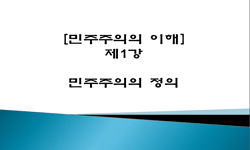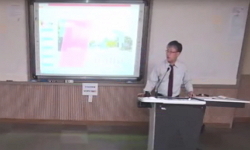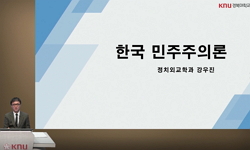본 논문은 이데올로기와 이슬람, 지역주의, 족벌(clan), 우즈벡 민족 문제등 다양한 요인들 중에서도 체제전환 및 내전, 그리고 종전 이후 국민 국가건설 등 최근까지의 타지크 정치사회적 변...
http://chineseinput.net/에서 pinyin(병음)방식으로 중국어를 변환할 수 있습니다.
변환된 중국어를 복사하여 사용하시면 됩니다.
- 中文 을 입력하시려면 zhongwen을 입력하시고 space를누르시면됩니다.
- 北京 을 입력하시려면 beijing을 입력하시고 space를 누르시면 됩니다.

타지키스탄 내전과 그 이후: 민족주의, 이슬람 그리고 민주주의 = Civil War in Tajikistan and Current Situation: Nationalism, Islam and Democracy
한글로보기https://www.riss.kr/link?id=A101897617
- 저자
- 발행기관
- 학술지명
- 권호사항
-
발행연도
2016
-
작성언어
Korean
-
주제어
민주주의 ; 이슬람 부흥당 ; 자유주의 ; 족벌 ; 타지크 민족주의 ; Clan ; Democracy ; Islamic Renaissance Party ; Liberalism ; Tajik Nationalism
-
등재정보
KCI등재
-
자료형태
학술저널
- 발행기관 URL
-
수록면
181-217(37쪽)
-
KCI 피인용횟수
0
- DOI식별코드
- 제공처
-
0
상세조회 -
0
다운로드
부가정보
국문 초록 (Abstract)
본 논문은 이데올로기와 이슬람, 지역주의, 족벌(clan), 우즈벡 민족 문제등 다양한 요인들 중에서도 체제전환 및 내전, 그리고 종전 이후 국민 국가건설 등 최근까지의 타지크 정치사회적 변화의 핵심으로 타지크 민족주의 적 요소가 있었음을 강조하고자 한다. 즉 체제전환기와 내전에 이르는 기간자유주의 정치세력에서 이슬람주의 정치세력에 이르기까지 다양한 저항 세력의 공통적 분모는 타지크 민족주의였으며, 내전 이후 옛 공산정권과는 달리, 라흐몬의 권위주의 정부가 민족주의의 의제들 중 상당부분을 수용하면서 저항 세력들의 입지가 크게 약화된 측면이 있는 것이다. 그러나 이제 소련 체제 붕괴 시기 반공산 민주화의 핵심 이데올로기였던 자유주의와 민족주의는 각각 제도적 민주주의의 외피와 시장경제 발전 과정 속에서 이후 그 급진성을 상실하거나 국민 국가 건설 과정에서 라흐몬 권위주의 정권의 지배 이데올로기의 일부가 됨으로써 그 진보적 성격이 사라지는 운명을 맞이하고 있다. 지역과 족벌, 종교 등에 기반한 정치가 아니라 이념과 정책에 기반한 정치로 전환할 때만이 민주주의가 정착될 수 있다고 할 때, 독특한 발전의 길을 걸어 왔던 타지크 이슬람 정치 세력의 부침과 새로운 정치 세력의 등장 등에 대한 연구를 통해 이슬람 지역에서의 민주주의의 발전 가능성에 대한 전망을 해 보고자 한다.
다국어 초록 (Multilingual Abstract)
This article aims shed light on the Tajik nationalism among the other factors, such as ideologies, Islam, religion, clan, and Uzbek minority problems that has had strong influences on the political and social changes in Tajikistan after the collapse o...
This article aims shed light on the Tajik nationalism among the other factors, such as ideologies, Islam, religion, clan, and Uzbek minority problems that has had strong influences on the political and social changes in Tajikistan after the collapse of Soviet Union, the civil war and nation-building so far. Throughout the period of transition and civil war, liberal and Islamist opposition parties-resistances have shared Tajik nationalism with each other. Since the end of the civil war, the opposition parties, including Islamic political party(Islamic Renaissance Party), have been weakened, because, unlike the former Communist Party, Rakhmon’s authoritarian regime have accommodated and adopted Tajik nationalism. However, liberalism and nationalism have lost their radical and progressive nature in the process of development of institutional democracy and market economy system and have become a part of the ruling ideologies by the Rakhmon’s authoritarian regime. It is said that democratic system can be improved and developed when it is based not on regionalism, clan, and religion, but on the idea and policy. In this context, through the study on the fate of the existing liberal and Islamic political parties and the appearance of the new political actors, the article try to forecast the passibility of development of the democracy in the Muslim countries.
참고문헌 (Reference)
1 Wagner, Steven, "Общественные Мнение в Таджикистане 1996 г" IFES 1997
2 Akbazadeh, Shahram, "Why did Nationalism Fail in Tajikistan?" 48 (48): 1105-1129, 1996
3 Horsman, Stuart, "Uzbekistan’s Involvement in the Tajik Civil War 1992-1997: Domestic Considerations" 18 (18): 37-48, 1999
4 Johnson, Lena, "The Tajik War: A Challenge to Russian Policy" RIIA 1998
5 Zviagelskaia, Irina, "The Tajik Conflict" Ithaca Press 1997
6 Rashid, Ahmed, "The Resurgence of Central Asia: Islam or Nationalism?" Oxford University Press 1994
7 Roy, Olivier, "The New Central Asia: The Creation of Nations" I. B. Tauris 2000
8 Bueno de Mesquita, Bruce, "The Logic of Political Survival" MIT Press 2003
9 Collins, Kathleen, "The Logic of Clan Politics: Evidence from the Central Asian Trajectories" 56 : 224-261, 2004
10 Rubin, Barnett, "The Fragmentation of Tajikistan" 35 (35): 71-91, 1994
1 Wagner, Steven, "Общественные Мнение в Таджикистане 1996 г" IFES 1997
2 Akbazadeh, Shahram, "Why did Nationalism Fail in Tajikistan?" 48 (48): 1105-1129, 1996
3 Horsman, Stuart, "Uzbekistan’s Involvement in the Tajik Civil War 1992-1997: Domestic Considerations" 18 (18): 37-48, 1999
4 Johnson, Lena, "The Tajik War: A Challenge to Russian Policy" RIIA 1998
5 Zviagelskaia, Irina, "The Tajik Conflict" Ithaca Press 1997
6 Rashid, Ahmed, "The Resurgence of Central Asia: Islam or Nationalism?" Oxford University Press 1994
7 Roy, Olivier, "The New Central Asia: The Creation of Nations" I. B. Tauris 2000
8 Bueno de Mesquita, Bruce, "The Logic of Political Survival" MIT Press 2003
9 Collins, Kathleen, "The Logic of Clan Politics: Evidence from the Central Asian Trajectories" 56 : 224-261, 2004
10 Rubin, Barnett, "The Fragmentation of Tajikistan" 35 (35): 71-91, 1994
11 Ubaidulloev, Mahmadsaid, "The Foundation of a Newest Statehood" Radunica 2002
12 Karagiannis, Emmanuel, "The Challenge of Radical Islam in Tajikistan: Hizb ut-Tahrir al-Islami" 34 (34): 1-20, 2006
13 Kabiri, Muhiddin, "The Challenge of Hizb ut-Tahrir: Deciphering and Combating Radical Islamist Ideology" The Nixon Center 75-81, 2004
14 Nairn, Tom, "The Break-up of Britain: Crises and Neo-nationalism" New Left Books 1977
15 Bergne, Paul, "The Birth of Tajikistan: National Identity and the Origines of the Republic" I. B. Tauris 2007
16 Berman, Sheri, "Taming Extremist Parties: Lessons from Europe" 19 : 5-18, 2008
17 Foroughi, Payam, "Tajikistan: Nationalism, Ethnicity, Conflict, and Socio-Economic Disparities-Sources and Solutions" 22 (22): 39-61, 2002
18 Akiner, Shirin, "Tajikistan: Disintegration or Reconciliation?" Royal Institute of International Affaires 2001
19 Olcott, Martha, "Roots of Radical Islam in Central Asia" 77 : 1-42, 2007
20 Hunter, Shireen, "Religion, Politics, and Security in Central Asia" 21 (21): 65-89, 2001
21 Dagiev, Dagikhudo, "Regime Change in Central Asia: Stateness, Nationalism and Political Change in Tajikistan and Uzbekistan" Routledge 2014
22 Naumkin, Vitaly V., "Radical Islam in Central Asia: Between Pen and Rifle" Rowman & Littlefield 2005
23 Roy, Olivier, "Qibla and the Government House: The Islamist Networks" 21 (21): 53-63, 2001
24 Linz, Juan, "Problems of Democratic Transition and Consolidation" The Johns Hopkins University Press 1996
25 Katznelson, Ira, "Preferences and Situations: Points of Intersection between Historical and Rational Choice Institutionalism" Russell Sage Foundation 2005
26 Levi, Margaret, "Preferences and Situations: Points of Intersection between Historical and Rational Choice Institutionalism" Russell Sage Foundation 219-246, 2005
27 Heathershaw, John, "Post-Conflict Tajikistan: The Politics of Peacebuilding and the Emergence of Legitimate Order" Routledge 2009
28 Diamond, Larry, "Politics in Developing Countries" Lynne Rienner Publishers 1995
29 Chatterjee, Suchandana, "Politics and Society in Tajikistan in the Aftermath of the Civil War" Hope India Publications/Greenwich Millennium 2002
30 Lijphart, Arend, "Patterns of Democracy: Government Forms & Performance in Thirty-six Countries" Yale University Press 1999
31 Bates, Robert, "On the Politics of Property Rights by Harber, Razo, and Maurer" 42 (42): 494-500, 2004
32 Kean, John, "Notions of Nationalism" Central European University Press 182-207, 1995
33 Chatterjee, Suchandana, "Networks, and Islamist Movements: Evidence from Central Asia and the Caucasus" 60 : 64-96, 2007
34 Keating, Michael, "Nations against The State" Palgrave 2001
35 Gill, Graeme, "Nationalism and the Transition to Democracy: The Post-Soviet Experience" 1-11, 2006
36 Nourzhanov, Kirill, "Nationalism and Identity Construction in Central Asia" Lexington Books 71-91, 2015
37 Brubaker, Rogers, "Nationalism Reframed: Nationhood and the National Question in the New Europe" Cambridge University Press 1996
38 Akcali, Pinar, "Nation-State Building in Central Asia: A lost Case?" 2 (2): 409-429, 2003
39 Yaacov, Ro’i, "Muslim Identity and Islamic Practice in Post-Soviet Central Asia" 28 : 303-322, 2009
40 Rashid, Ahmed, "Jihad: The Rise of Militant Islam in Central Asia" Yale University Press 2002
41 Bowyer, Anthony, "Islamic Movements and Democracy in Central Asia: Integration or Isolation?" 173-197, 2008
42 Yaacov, Ro’i, "Islam, State, and Society in Central Asia" 3 : 242-253, 2003
43 Ruzaliev, Odil, "Islam in Uzbekistan: Implications of 9/11 and Policy Recommendations for the United States" 25 (25): 14-15, 2005
44 North, Douglass, "Institutions, Institutional Change and Economic Performance" Cambridge University Press 1990
45 Knight, Jack, "Institutions and Social Conflict" Cambridge University Press 1992
46 Marat, Erica, "Imagined Past, Uncertain Future: the Creation of National Identities in Kyrgyzstan and Tajikistan" 12-24, 2008
47 Akbazadeh, Shahram, "Geopolitics versus Democracy in Tajikistan" 563-578, 2006
48 Mecham, R. Quinn, "From the Ashes of Virtue, A Promise of Light: The Transformation of Political Islam in Turkey" 25 (25): 339-358, 2004
49 Fumagalli, Matteo, "Framing Ethnic Minority Mobilisation in Central Asia: The Cases of Uzbeks in Kyrgyzstan and Tajikistan" 59 (59): 567-590, 2007
50 Manja, Stephan, "Education, Youth, and Islam: The Growing Popularity of Private Religious Lessons in Dushanbe, Tajikistan" 29 : 469-483, 2010
51 Bermeo, Nancy, "Democracy and the Lessons of Dictatorship" 24 (24): 273-291, 1992
52 Demirtepe, M. Turgut, "Creating the Uzbek Nation: Ethnie, Identity and Politics" Manchester University 2004
53 Sartori, Giovanni, "Comparative Constitutional Engineering" New York University Press 1997
54 Tilly, Charles, "Coercion, Capital and European States" Basil Blackwell 1990
55 Chatterjee, Suchandana, "Clan Politics and Regime Transition in Central Asia" Cambridge University Press 2006
56 Kuzmin, A. I., "Central Asia: Political and Economic Challenges in the post-Soviet Era" Saqi Books 175-219, 2001
57 Fanon, Frantz, "Black Skin and White Masks" Grove Press 2008
58 Oliva, Fabio, "Between contribution and disengagement: Postconflict elections and the OSCE role in the normalization of armed groups and militarized political parties in Bosnia and Herzegovina, Tajikistan, and Kosovo" 37 : 192-207, 2007
동일학술지(권/호) 다른 논문
-
2008년 금융위기 이후 극동 러시아의 에너지, 물류 투자의 현황과 계획
- 서울대학교 러시아연구소
- 조정원 ( Jungwon Cho )
- 2016
- KCI등재
-
문화와 반(反)문화의 동력학: 바흐친 사유에 나타난 소수성과 생성의 정치학
- 서울대학교 러시아연구소
- 최진석 ( Jin Seok Choi )
- 2016
- KCI등재
-
- 서울대학교 러시아연구소
- 정하경
- 2016
- KCI등재
-
러시아 경제위기와 정부의 대응정책: 2008년과 2014년 경제위기의 비교분석
- 서울대학교 러시아연구소
- 박지원 ( Ji Won Park )
- 2016
- KCI등재
분석정보
인용정보 인용지수 설명보기
학술지 이력
| 연월일 | 이력구분 | 이력상세 | 등재구분 |
|---|---|---|---|
| 2026 | 평가예정 | 재인증평가 신청대상 (재인증) | |
| 2020-01-01 | 평가 | 등재학술지 유지 (재인증) |  |
| 2017-01-01 | 평가 | 등재학술지 유지 (계속평가) |  |
| 2013-01-01 | 평가 | 등재학술지 유지 (등재유지) |  |
| 2010-01-01 | 평가 | 등재학술지 유지 (등재유지) |  |
| 2008-01-01 | 평가 | 등재학술지 유지 (등재유지) |  |
| 2006-01-01 | 평가 | 등재학술지 유지 (등재유지) |  |
| 2003-01-01 | 평가 | 등재학술지 선정 (등재후보2차) |  |
| 2002-01-01 | 평가 | 등재후보 1차 PASS (등재후보1차) |  |
| 2000-07-01 | 평가 | 등재후보학술지 선정 (신규평가) |  |
학술지 인용정보
| 기준연도 | WOS-KCI 통합IF(2년) | KCIF(2년) | KCIF(3년) |
|---|---|---|---|
| 2016 | 0.64 | 0.64 | 0.47 |
| KCIF(4년) | KCIF(5년) | 중심성지수(3년) | 즉시성지수 |
| 0.39 | 0.36 | 0.737 | 0.26 |





 KCI
KCI KISS
KISS






